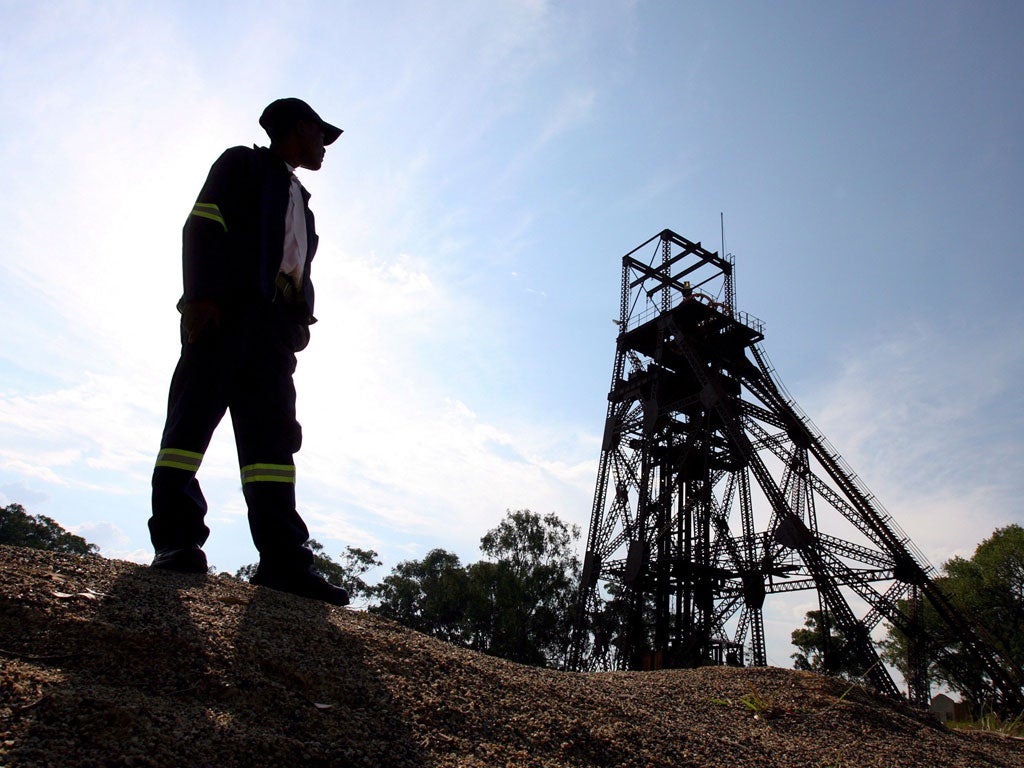Gold miners call British firm to account
Anglo American is being taken to court for not protecting its workers in South Africa from dangerous dust

Your support helps us to tell the story
From reproductive rights to climate change to Big Tech, The Independent is on the ground when the story is developing. Whether it's investigating the financials of Elon Musk's pro-Trump PAC or producing our latest documentary, 'The A Word', which shines a light on the American women fighting for reproductive rights, we know how important it is to parse out the facts from the messaging.
At such a critical moment in US history, we need reporters on the ground. Your donation allows us to keep sending journalists to speak to both sides of the story.
The Independent is trusted by Americans across the entire political spectrum. And unlike many other quality news outlets, we choose not to lock Americans out of our reporting and analysis with paywalls. We believe quality journalism should be available to everyone, paid for by those who can afford it.
Your support makes all the difference.A British gold mining firm is to appear in the High Court next month, accused of exposing workers in South Africa to life-threatening diseases caused by dust in the mines.
More than a thousand former miners from South Africa are bringing a case against Anglo American through the British courts after contracting the incurable lung disease silicosis. They say they were offered no masks, ventilation or proper protection from dust in mines part-owned by Anglo American, even though it was known that the dust could be harmful.
Silicosis increases the risk of contracting tuberculosis, which is endemic in rural South Africa, and the combination of the two conditions is often fatal. The case, which relates to workers exposed to dust up to 1998, also goes to the heart of race relations in South Africa during the apartheid era. While most black workers were not given face masks, the miners allege that white inspectors and senior staff were.
This week an exhibition and public meeting will be held in London to draw attention to the plight of the miners. The events, which will be held at Westminster Hall on Tuesday and Trades Union Congress House on Wednesday, have been scheduled to take place before Anglo American's AGM in London on Thursday.
Workers were brought to the mines from rural areas, such as the Eastern Cape, as well as from neighbouring countries such as Lesotho and Botswana. Rates of silicosis and tuberculosis are very high among black gold miners, who were given the dustiest jobs in the mines.
A legal action has been languishing in the South African courts since 2004 and the High court will decide next month whether the company can be sued in the UK.
If the test case succeeds it could mean that tens of thousands of former miners get support or compensation for ill health.
Anglo American argues it is not liable for the claims because the company did not have a majority stake in the mines. A spokeswoman said: "Anglo American does not believe that it is any way liable for the silicosis claims brought by former gold workers and is defending the actions."
Vuyisile Bunge, 66, lives in a village in the Eastern Cape called J B Location. He now has tuberculosis and silicosis after working for 25 years at President Steyn mine, part-owned by Anglo American, in the Free State. "I got weaker and weaker because of my chest ... I think Anglo should help us; I don't think they've treated us very well."
The All Party Parliamentary Group on International Corporate Responsibility is proposing to make it compulsory for companies to report back to shareholders on their human rights record. The group has tabled an amendment to the Financial Services Bill, which would mean that companies would be legally obliged to inform shareholders if others have questioned their corporate ethics.
Lisa Nandy MP, who tabled the Bill, said: "The alleged Anglo American link with silicosis in South Africa is just one of many examples that demonstrate the need for greater regulation of British-based multinationals. The London Stock Exchange is currently host to a number of companies that have been accused and found guilty of gross violations of human rights, particularly in countries in conflict or deemed 'high risk'. The UK is trailing behind competitor stock exchanges in upholding human rights. Hong Kong, Johannesburg, Shanghai and Brazil are just some of those that have taken steps to demand high standards from business on human rights and the environment."
Natbeni Mafolwana
Former gold miner
Mr Mafolwana, 64, inset, worked at President Steyn gold mine in South Africa's Free State for 23 years. He breathes with a low whistle as he struggles to draw air into his lungs. "At the mine training school they said that there were masks available for the dust, but I never saw any masks down there. I was always covered in dust and, if there was a rockfall, there would be even more. Now the doctor says I have silicosis and tuberculosis. I had to stop working in security because my chest hurt. My life was ended at the mine. The least they can do is give me money to make me able to cope."
Join our commenting forum
Join thought-provoking conversations, follow other Independent readers and see their replies
0Comments